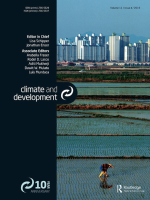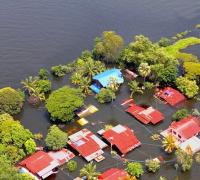Climate-related relocation: The pitfalls and unintended outcomes
How are peopled moved when their homes disappear? What do seemingly mundane planning and implementation processes mean for relocated households and their well-being? And what can this tell us about the prospects for climate-related relocation and adaptation initiatives more generally?
A new article by Researcher Lily Salloum Lindegaard gets to the heart of these questions. The article sheds light on the convergence between mobility and climate change and the way this intersection is managed. Its findings challenge the prominence of technical approaches to adaptation and support burgeoning literature emphasizing adaptation’s highly political nature.
Specifically, the article examines planned relocation as climate change adaptation. As climate change impacts are intensifying globally, planned relocation and resettlement are increasingly recognized as an adaptation response. Such interventions are intrusive and controversial, but are prompted by difficult circumstances including disappearing coastlines, repeated flooding, and extreme events. Yet even when used as a last resort, many choices remain as to how climate-related relocation is carried out, with significant implications for affected households.
This article examines such choices in climate-related relocations in coastal Vietnam. In the case area, coastal erosion, linked to climate change, is threatening and destroying homes. Entire villages and thousands of households are being moved in response. This dramatic backdrop contrasts starkly with the banal, technical practices used to monitor coastal change and plan and implement relocation.
The article documents how such practices are decisive for the outcomes of those targeted. It finds that highly technical practices of monitoring environmental change, when used as the main basis for formulating and implementing relocation, fail to broadly deliver adaptive outcomes. Technical approaches are widespread in attempts to manage the environmental uncertainty prompted by climate change. Yet they are unable to address the highly complex social, political, economic and environmental dynamics at play. In this case, they contributed to rigid programmes in which households’ input and adaptive outcomes were limited and other political goals were realized.
DIIS Eksperter


